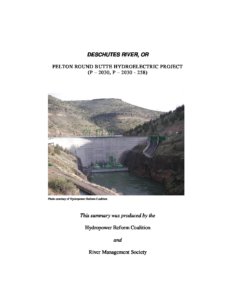Court Victory for Clean Water and State Regulators in California
Contacts:
- Melinda Booth, South Yuba River Citizens League, 650-207-0495, melinda@yubariver.org
- Chris Shutes, California Sportfishing Protection Alliance, 510-421-2405, blancapaloma@msn.com
- Ron Stork, Friends of the River, 916-442-3155 x220, rstork@friendsoftheriver.org
- Andrew Hawley, Western Environmental Law Center, 206-487-7250, hawley@westernlaw.org
Today, a panel of judges from the U.S. Court of Appeals for the Ninth Circuit overruled the Federal Energy Regulatory Commission (FERC), re-establishing California’s right to protect water quality in the Yuba, Bear, and Merced River Watersheds for the next 40 years.
One of FERC’s primary duties is licensing and inspecting private, municipal, and state hydroelectric projects. As part of this licensing process, Section 401of the federal Clean Water Act requires license applicants for hydroelectric projects to request that the state and Tribal Nations with certification responsibilities certify that new licenses will protect water quality as required by state law.
The Clean Water Act gives states a year to act on certification. In the three cases, the applicants for certification withdrew their requests before one year expired. FERC had found that the California State Water Resources Control Board’s (Board’s) acceptance of the applicants’ withdrawals, including perfunctory emails and comments outlining options, showed that the state was complicit in circumventing the one-year rule. Essentially, FERC, relying on a 2019 case called Hoopa Valley Tribe v. FERC, had held that the Board waived its chance to certify.
The court disagreed, reversing FERC’s orders, finding there was no substantial evidence that the Board had acted to skirt the one-year rule. Instead, the court found: “a state’s mere acceptance of a withdrawal-and-resubmission is not enough to show that the state engaged in a coordinated scheme to avoid its statutory deadline for action. Accordingly, FERC’s orders cannot stand.”
FERC had also said that the applicants’ failure to complete environmental review as required by the California Environmental Quality Act (CEQA) didn’t matter. Again, the court disagreed with this assertion, stating, “In short, the records in all three orders under review demonstrate that the Project Applicants chose to withdraw and resubmit their certification requests because they had not complied with California’s CEQA regulations.”
The court was clear on the stakes of the decision, noting: “[I]f a state waives its authority to impose conditions on a hydroelectric project’s federal license through Section 401’s certification procedure, that project may be noncompliant with prevailing state water quality standards for decades.”
South Yuba River Citizens League, California Sportfishing Protection Alliance, Friends of the River, and Sierra Club and its Mother Lode and Tehipite chapters were environmental litigants in the case, along with
the California Attorney General’s Office on behalf of the Board. Water Power Law Group and the Western Environmental Law Center represented the environmental litigants.
“The South Yuba River Citizens League and our colleagues have been working in FERC relicensing on the Yuba River for 15 years,” said Melinda Booth, executive director of the South Yuba River Citizens League. “It is a huge relief that the state’s protection will be in force in the decades to come.”
“Since the Hoopa Valley Tribe ruling in 2019, some hydropower operators have been looking for ways to skate from the Clean Water Act,” said Chris Shutes, FERC projects director for the California Sportfishing Protection Alliance. “Today’s ruling restores process discipline and affirms the Act’s primary role to protect water quality.”
“The court got it right,” said Ron Stork, senior policy advocate with Friends of the River. “No applicant for a FERC license should be able to not follow the rules and then turn around and blame the state.”
“This decision is local, but it could have national significance,” said Rob Burness, Vice Chair, Conservation Committee, Sierra Club Mother Lode Chapter.
“Today’s reversal of FERC’s string of illogical rulings errantly waiving states’ rights to enforce their environmental laws under the Clean Water Act feels like the end of an era of abuse,” said Andrew Hawley, senior attorney at the Western Environmental Law Center. “Before today, people unconcerned with protecting clean water were positioned to weaponize a decision called Hoopa Valley v. FERC to severely constrain well-established state and Tribal rights guaranteed by the Clean Water Act. Today, we closed the Hoopa Valley Clean Water Act loophole.”
The cases are No. 20-72432, No. 20-72452, and No. 20-72782.


